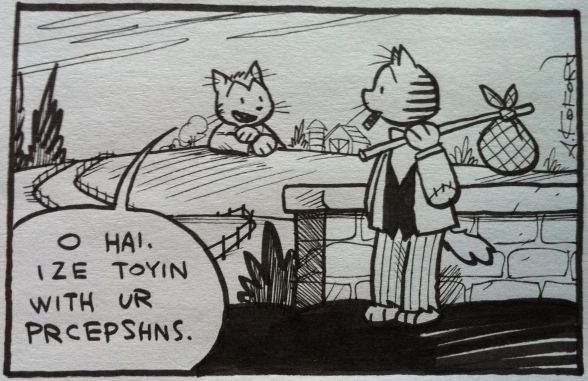Of course you’re reading Jane Espenson’s blog on a regular basis, but let me underscore one of my favorite bits in yesterday’s entry: “And I love the fact that [Rome] pretty much assumes their audience is familiar with Shakespeare. Amazing. After all, there are shows that don’t even assume we’re familiar with the contents of the previous scene.”
Author Archives: Craig
Moms say the darnedest things
We haven’t explicity plugged Overheard in New York (featured in Stuff We Like), but it’s frequently treatful, and I found one of today’s quotes terribly sweet.
Dzur Review
Dzur, Brust. Yes. Brust uses a couple devices in this installment near the limits of what they’ll tolerate, aggravated by my belief that the parallel construction (device one) seems to exist only to help justify the weak tie of the action to the title (device two). That (minor, really) distraction aside, this is a Vlad Taltos novel, in more of the classic mold than we’ve seen in several books. As cranky as I’ve become of late, I still enjoy Brust’s writing.
I remembered his ties to the so-called "Pre-Joycean Fellowship" and dug around to find out what that’s about (when I last considered the question, rec.arts.sf (pre-split) was my sole source of info; things have changed somewhat). Finding this old post of Brust’s has yet again brought home the realization that I’m not looking for straight-forward storytelling so much as I am looking for writing in service of the story and the characters. If your story needs trickery (and you’re good enough to pull it off), you must get tricky. Zelazny is, after all, a hero of mine, too.
Is Muslim the new gay?
I’m amazed at the amount of unvarnished anti-Muslim bigotry that’s being thrown around. I suppose it’s likely enough that these nutcases would say (or are saying) the same thing about the openly gay members of Congress, and it’s just not getting as much play, but I can’t help thinking there’s a new bottom rung on the ladder.
Ask the Dust Review
Ask the Dust, Fante. Yes. Another Dan Bern suggestion, and another well-written work. I deferred the Charles Bukowski introduction until I had finished the book, as so many introductions say too much about what follows. If an author wants to spill what’s going on in an introduction to his own work, that’s one thing, but nobody else ought to presume. Turns out Bukowski did a very good job of talking about why he loved Fante without saying anything damagingly revealing about the book itself. Both Fante and Ring Lardner write very well about—well, people—and that so frequently means that there’s an undertone (or sometimes fundamental tone) of despair that reminds me why I can’t read too much Theodore Sturgeon at a time. It also means, sometimes, that my attention span isn’t long enough, so I every so often long for something to happen, already. I will pretend this is the same thing a colleague of mine means when he says he prefers books with a "big idea". Y’know, like Zombies.
Thanks, Wikipedia
Wikipedia finally got an updated page about Forced Perspective. It’s still not exhaustive, omitting at least still photography, but it at least acknowledges the architectural uses. If I were a better person, I would update it instead of whining; but if I were that person, I would have updated it a couple years ago.
World War Z Review
World War Z: An Oral History of the Zombie War, Brooks. Yes. The various editing (and, I hope, proofing) problems (some typos, two unrelated occurrences of "a millenia", on ne passé pas for on ne passe pas (again, at least twice)) and occasional lapses into preaching were not enough to discourage me from deeply enjoying this book. I was surprised that Brooks (the son of Mel) was not more hampered by the structure he chose in weaving a coherent and compelling narrative. Some of the jargon struck me as unlikely, but predicting slang is fraught with peril.
I was perplexed to find that the Cataloging-in-Publishing puts the book in "War—Humor": the absurdity of its premise notwithstanding, WWZ is straight drama. Not to say there is no humor—I daresay humor is a vital component of any drama—but the book is not, and does not want to be, a laff riot.
Best Short Stories of Ring Lardner Review
The Best Short Stories of Ring Lardner, Lardner. Yes. On Dan Bern’s recommendation, I gave Mr Lardner a try. His frequent use of heavy dialect (I think it was one of his trademarks) was occasionally distracting and sometimes historically revealing (several not-especially-literate speakers said "w’ile", implying that at least some folks in the early 20th century distinguished between "w" and "wh"). The stories overall were well-written, and by and large held my interest.
Metamagical Themas Review
Metamagical Themas: Questing for the Essence of Mind and Pattern, Hofstadter. Non-fiction.
The Last Days Review
The Last Days, Westerfeld. Yes. This is nominally a sequel to Peeps, but I found it interesting to imagine reading it without having read Peeps. Each gives what could be premature insight into the events of the other, though, so perhaps the ideal situation would be to read each with no memory of the other.
